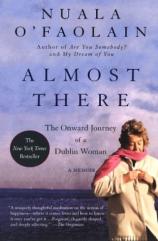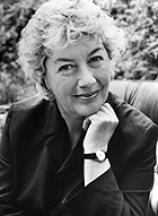Reading Group Guide
Discussion Questions
Almost There: The Onward Journey of a Dublin Woman

1. In the first chapter of Almost There, O'Faolain relates, during her thoughts about the end of her relationship with her lover Nell, how she quit smoking. For O'Faolain, how is quitting smoking like quitting a lover? What other habits does she try to break? For O'Faolain, is love a habit she's trying to break? Is she ever successful?
2. On page 12, O'Faolain writes "…how close to crazy I really was, when thinking I'd lost the dog woke up too vividly everything I'd ever lost-my mother and father, all the other people, all the love affairs, all the places I'd lived, all the intimacy and warmth of my home, the investment of all the years of love that came to nothing. Everything." What do you make of this statement? What is she referring to when she writes "nothing" and "everything"? Why does the threat of losing her dog cause her to panic so dramatically?
3. How does letting Luke into her life change O'Faolain? What does he teach her about platonic friendship?
4. O'Faolain writes, "I was not, when I began writing my life story, and am not now, healed of my mother" (pg. 36). Given the way this memoir ends, do you believe it is possible for O'Faolain to ever be healed of the pain her mother caused her? Does she consider her relationship with her father differently? How do her mother and father haunt O'Faolain? What aspect of her own life is she constantly measuring against her mother's life? How do her feelings for her father creep into her relationships with men? What about her sisters and brothers? How does each of them struggle with the past? How do they fail or succeed to beat their own ghosts back?
5. Discuss O'Faolain's ever-shifting relationship with America. How does it evolve? How does she grow from living in New York and touring the country? How does spending time in America change her relationship with Ireland?
6. O'Faolain discusses her reaction to Nell's showing a draft of Are You Somebody? to a friend, and how upset it makes her, as if she's been violated. Why does she have such a strong reaction to sharing a manuscript she's planning to publish worldwide? Who really has the rights to the true stories we tell? Is Nell just as much entitled to stories of her as O'Faolain?
7. Once she finds out Joseph is married, O'Faolain claims to regret the affair, although she continues to see Joseph when she can. Do you think she truly regrets the affair, considering that it is the inspiration for her novel?
8. "It took decades to learn how to talk myself into believing, every time I went out to do a job, that I would not fail….It was only after I wrote Are Your Somebody? and it was a success that the side of me that confidently leads me on became just a little stronger than the side that undermines the confidence and drags me back" (pg. 108). Given everything she tells us throughout this memoir, do you agree with O'Faolain's assessment of herself? Is she confident? How does her self-doubt leak into other aspects of her life beyond her writing?
9. O'Faolain reflects often on the differences between writing fiction and non-fiction. Do you have a sense of which genre is more fulfilling for her?
10. How does the tragedy of September 11th, 2001 change O'Faolain's feelings for America? How does it make her feel more a part of America? How more separate? How does she-and those she knows-resolve their fears and sadness?
11. As O'Faolain describes the letters she receives from readers, she comments on how some of them seem to have actually fallen in love with her, proposing trans-continental dates and even marriage. In general, why do we fall in love with writers? What do writers offer their reader that is so romantic?
12. How does O'Faolain try to conquer her overpowering feelings of loneliness? Does she ever succeed? She remarks that she can feel terribly lonely but very happy at the same time. How does she resolve the juxtaposition between these two contradicting emotions?
13. On page 161, O'Faolain writes, "The first thing is you must live. As long as you are alive, something might change." Where do you see O'Faolain applying this optimistic philosophy in her own life? At what times does the philosophy fail her?
14. Does O'Faolain's relationship with John fill the voids in her life? Is her reaction to his daughter justified? What is she reacting to when she acts out about the little girl?
15. How does O'Faolain succeed as a feminist? How does she fail? What about Irish culture squelches feminism? Considering she sees America as a place where feminism is embraced and women can overcome obstacles, does living in America do anything to make her stronger and more confident in being a woman?
16. "Climbing on my own words and the words of other people, the journey has been upward all the way. Writing has brought me up from the underground. I've been my own Orpheus" (pg. 168). How does this statement relate back to the title and subtitle of the book? Do you feel that these relate to writing, life, or both? As the title of the book is Almost There, what do you think O'Faolain is moving towards? Do you think she truly is almost there?
Almost There: The Onward Journey of a Dublin Woman
- Publication Date: April 6, 2004
- Genres: Nonfiction
- Paperback: 288 pages
- Publisher: Riverhead Trade
- ISBN-10: 1573223743
- ISBN-13: 9780641819094







